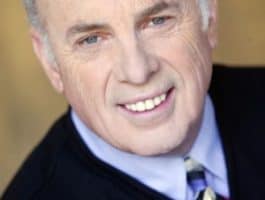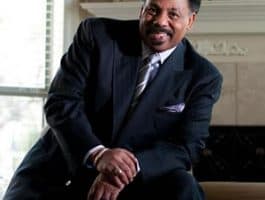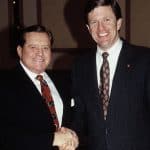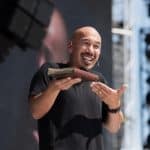
Preachers and Teachers
The only two things that will last forever are God's Word and people's souls. Therefore, studying and teaching the Bible is of great importance. Hear from noted bible teachers Chuck Swindoll, Kay Arthur, John MacArthur, and Tony Evans.
Show Notes
About the Host
About the Guest
-
Kay Arthur tells the secret of how to hold a marriage together.
John MacArthur tells what parents need to be teaching their children now if they are to become wise adults someday.
Pastor Tony Evans talks about the various names of God and the powerful meaning behind them. -
Dave and Ann Wilson
Dave and Ann Wilson are hosts of FamilyLife Today®, FamilyLife’s nationally-syndicated radio program. Dave and Ann have been married for more than 38 years and have spent the last 33 teaching and mentoring couples and parents across the country. They have been featured speakers at FamilyLife’s Weekend to Remember® marriage getaway since 1993 and have also hosted their own marriage conferences across the country. Cofounders of Kensington Church—a national, multicampus church that hosts more than 14,000 visitors every weekend—the Wilsons are the creative force behind DVD teaching series Rock Your Marriage and The Survival Guide To Parenting, as well as authors of the recently released book Vertical Marriage (Zondervan, 2019). Dave is a graduate of the International School of Theology, where he received a Master of Divinity degree. A Ball State University Hall of Fame quarterback, Dave served the Detroit Lions as chaplain for 33 years. Ann attended the University of Kentucky. She has been active alongside Dave in ministry as a speaker, writer, small-group leader, and mentor to countless wives of professional athletes. The Wilsons live in the Detroit area. They have three grown sons, CJ, Austin, and Cody, three daughters-in-law, and a growing number of grandchildren.
-

Chuck Swindoll
Charles R. Swindoll has devoted his life to the accurate, practical teaching and application of God’s Word and His grace. A pastor at heart, Chuck has served as senior pastor to congregations in Texas, Massachusetts, and California. Since 1998, he has served as the founder and senior pastor-teacher of Stonebriar Community Church in Frisco, Texas, but Chuck’s listening audience extends far beyond a local church body. As a leading program in Christian broadcasting since 1979, Insight for Livin...more
John MacArthur
John MacArthur is the pastor-teacher of Grace Community Church in Sun Valley, California, as well as an author, conference speaker, president of The Master’s College and Seminary, and featured teacher with the Grace to You media ministry.
Kay Arthur
Kay Arthur is one of America's best-known and most-beloved Bible teachers and authors. With her husband, Jack, she is the co-founder of Precept Ministries International, the leaders in inductive Bible-study resources. Kay also reaches hundreds of thousands of people internationally through her "Precept upon Precept" inductive Bible studies. In addition, her daily and weekly television programs air on over 900 stations in 30 countries.
Tony Evans
Dr. Tony Evans is one of the country’s most respected leaders in evangelical circles. As a pastor, teacher, author and speaker, he serves the body of Christ through his unique ability to communicate complex theological truths through simple, yet profound, illustrations. While addressing the practical issues of today, Dr. Evans is known as a relevant expositor. New and veteran pastors alike regard him as a pastor of pastors and a father in the faith. The first African-American to graduate w...more
Studying and teaching the Bible is of great importance. Hear from noted bible teachers Chuck Swindoll, Kay Arthur, John MacArthur, and Tony Evans.
Preachers and Teachers
Bob: Of course, that’s wisdom from Chuck Swindoll. He’s been a good friend to you throughout the years; hasn’t he?
Dennis: He has been a mentor.
Bob, I think, sometimes, we need to kind of pull the curtains back from these famous people; because every one of them has a context in which they’re coming at life. Kay Arthur was another guest, here, on FamilyLife Today. She took us back to the days before she was a follower of Christ—before she had been born again. Her story is not unlike many of our listeners’.
[Previous Interview]
Dennis: Before you became a believer, you had a marriage that failed.
Kay: Yes; I have lots of regrets about that marriage; and yet, I have a clear conscience, because I’ve come to know Christ since I was married to my husband. I married a man, and I wanted the storybook marriage. I wanted a marriage that was going to last. Divorce was not in my vocabulary.
8:00
Six years later, and two boys later, on the advice of two ministers that never opened the Word of God, I left my husband. I went out, and I became an immoral woman. I went from one man to another man to another man, looking for a man who would love me unconditionally.
One day, I saw a man—and He opened His arms wide—He said, “I love you this much!” That’s when I found the Agape kind of love / the unconditional love—that loves me when I’m a sinner, that loves me when I’m ungodly, that loves me when I’m an enemy, that loves me when I’m helpless and hopeless—and doesn’t leave me in any of those states after that love takes root in my heart through believing in Jesus Christ.
I’m open about my past—because after I married Jack, and I had our third son—I remember sitting there, and nursing him one day, and crying.
9:00
I thought: “God! Why do I have to be married twice? Why do I have to have two boys that have had two fathers and have been through this pain? Why, God?!” As the Scripture—in Galatians, Chapter 1, [verses 15 and 16]—“…when it pleased God to reveal His Son in me…—when God showed me that, I said, “Okay.” He just said to me, in my heart: “I saved you when I wanted to save you. Now, if you’ll quit moaning and groaning about the past, and you’ll share it with others, I’ll use that to give them hope.”
You see, He’s the Redeemer! If I could see how He could take all my mistakes, and all my errors, and all my sins and redeem them and use them—bring beauty out of ashes—then it was alright, because my times are in His hands. “How can you have a marriage without regrets?”—when you stand before God and you can say: “I did it Your way—
10:00
—“not my way! I did it Your way.”
[Studio]
Bob: Well, again, that’s Kay Arthur—being very candid, very honest, [and] very transparent—but that’s been so helpful for so many. It gives them hope!
Dennis: It does. What I want the listener to know, right now, is: “Nothing you have done/nothing you have said—no mistake, no error, no grievous sin—is beyond God’s forgiveness or beyond God’s reach to redeem. He can pick you up out of those ashes that she mentioned, and He can use you for His purposes.
In fact, I love to hear them, here, on FamilyLife Today; and I love to tell great redemption stories of how Jesus Christ took somebody, who was down and out, and thought their life was over, and used them for His purposes.
Bob: We’ve heard a lot of those stories over 25 years; in fact, often when people have come to me and said, “Who have been your favorite interviews—
Dennis: Oh, yes!
Bob: —“over 25 years?” [Laughter]
11:00
I’ve said, “Probably names you would not know, but people who were just candid about God’s redeeming work in their lives.”
Dennis: Yes; and this next guest that you’re going to hear on FamilyLife Today is no stranger to our audience—John MacArthur, pastor in Southern California, for—it has to be over 40 years.
Bob: It is. John MacArthur, of course, is a well-known Bible teacher. He hosts Grace to You, the radio program that’s on many of these same stations. He pastors Grace Community Church in Southern California. He’s the President of The Master’s College and The Master’s Seminary. He has written—I don’t know how many books—maybe close to 100 books. And we talked to him about the Bible and parenting.
[Previous Interview]
Dennis: You taught your children from the Bible. One of the primary books you taught from was the Book of Proverbs. You pass along several lessons that you learned from the Book of Proverbs that you wanted to instruct your children in.
12:00
The first one was so fundamental.
John: Proverbs lays these out in the opening chapters for every parent to teach their children. Again, I’m such a Biblicist—I’m so committed to the text—because I think God has given it to us for instruction for our lives and for the lives of all we influence. It all starts, in Proverbs, with this great overarching concept of fearing God: “Teach your children to fear their God,”—that’s the primary issue.
That starts out with salvation: “The Scriptures are able to make you wise unto salvation.” You remember—the Apostle Paul said that to Timothy, and Timothy had learned that, as a child, from his mother and his grandmother. So, fearing God starts with knowing God. You can’t worship Him; you can’t reverence Him, adore Him, praise Him, honor Him, [and] obey Him unless you really know Him. So, that’s where all of our instruction began. I have always felt, as a parent, that my primary responsibility was to lead my child to the knowledge of Jesus Christ.
13:00
I was basically the most vital—along with Patricia, my wife—the most vital evangelist in their life. I was the greatest influence for the gospel that they would ever know.
Dennis: There’s a second way that you talk about passing on wisdom to your children; and boy, is it relevant!—we’re talking all around it here. You say we should teach our children to be wise by teaching them to guard their hearts. That’s straight out of Proverbs 4:23: “Guard your heart, for from it flow the wellsprings of life.”
John: And the “heart” is the Hebrew term for “mind,”—it’s the seat of thought. Fearing God is number one, and number two is to guard the child’s mind. This is so, so critical. I mean, you can’t just let them sit and watch anything they want to watch. You can’t let them spend their time with just any group of people that they choose to spend their time with. You have a parental responsibility to guardianship over their thinking in those early years.
14:00
And I think you have to be very, very involved in what goes into those impressionable minds; because, in the end, what protects the child is not that you don’t ever let them get any bad information in, but that you fill them with what is true—that, itself, becomes the protection.
[Studio]
Bob: Again, that’s John MacArthur; and that’s good wisdom from John.
Dennis: I’ve got to tell you a great story about John MacArthur. My children, when they were in high school, had a principal whose name was Herbert Brooks. His life was changed by listening to John MacArthur. And so, when John was coming here to be on the radio, I called Herbert and I said, “Herbert, what are you doing today for lunch?” He said: “I’ve got these meetings with the school district. I’ve got to go down there over lunch and meet with them.” I said, “I hate that, because I’ve got somebody for you to have lunch with.” He said, “Who?” I said, “John MacArthur.” And Herbert said: “I’ll get right back to you! I’ve got to make a couple of phone calls.” [Laughter]
15:00
He made the phone calls / got free. Herbert rode with me to go pick up John MacArthur. On our way to the office, I had Herbert share his testimony of how John MacArthur had touched his life. And John was beaming! He was absolutely blown away; because God used Herbert in a powerful way to influence thousands of students, here, in Central Arkansas.
Bob: Yes; when you stop and think about the impact that someone like Chuck Swindoll, John MacArthur, [or] Kay Arthur—the impact they’ve had on lives—I mean, my life has been marked by these same people; and yours has as well.
Dennis: That’s right.
I’m thinking about this next guest, Tony Evans. All over the nation, I run into people who have been ministered to by Tony through his preaching, teaching, [and] radio broadcasts. He is just a great man and a great friend.
Bob: Well, when your wife Barbara started creating Christmas tree ornaments with the names of Christ on them, Tony had written a book on the names of God from a sermon series he had done.
Dennis: Right.
16:00
Bob: We just asked him to come in and talk to us about the benefit that comes from understanding the various names for God.
[Previous Interview]
Tony: When I began to discover the various names of God in Scripture—and how tied they were to people’s lives, circumstances, problems, and needs—then I began to make the correlation that God had a name for our circumstances in life. In fact, most of those names come out of situations that people were in. Then, when I saw the significance of names, in general—God would change people’s names—He changed Jacob to be Israel because of the situation, the circumstance, or the message He wanted to communicate—then it becomes very obvious that God is into names. Unfortunately, today, we name names because we like them, not necessarily because they have significance—sometimes, we do—but in God’s case, His name and the names He ascribes have significance, meaning, application, and transformation.
17:00
And so, because of all that was involved with that, it was a great study and a great thing to teach. It became a great thing to write about in order to get to know God better. The bottom line is—God gives us insight into His character through the use of His names.
Dennis: Yes; we get to know Him through His names.
Tony: Absolutely!
Dennis: And we find the importance of His Name all the way back to the Ten Commandments.
Tony: Absolutely.
Dennis: And then, again, in the Lord’s Prayer, when the Savior taught us how to pray—He said, “Hallowed be Thy Name.” Unpack both of those—what it means in the Ten Commandments about not taking God’s name in vain and then, later on, in the Lord’s Prayer.
Tony: Well, because God’s names are a reflection of His person and His character, He wants His name to be honored for the person who stands behind the name. When we talk about people in our culture, whether they’re the President or whether they’re the Mayor or the Governor, their name reflects their position. That position has a certain level of authority assigned to it.
18:00
We don’t want people to call us out of our name, and God doesn’t want to be called out of His name. So to take the name of the Lord in vain—the word, “vain,” means “unto emptiness; without its meaning attached to it.” There is a person behind the name—so don’t mess with the name, because you don’t want to insult the person. It has to do with the value of the person.
The word, “hallow,” in the Greek text means “to set apart as unique; special; one of a kind; in a class by itself.” So, you don’t treat God’s name—certainly, not profane—but neither do you treat it as common—“Holy is His name.” So, it’s sort of like—in the kitchen, you’ve got the dishes in the sink. We’ll call those the “profane” dishes, because they’re dirty. [Laughter]
And then, you’ve got the dishes in the cupboard—those are the regular dishes—breakfast, lunch, and dinner. But then, you’ve got these dishes that are in the dining room—and they’ve got their own room; they’ve got their own glass cabinet; they’ve got their own specialized silverware.
19:00
You’d better not touch those, because those are for guests on special occasions and birthdays; you know?—because they have been sanctified as unique and are treated that way.
God’s name is unlike any other name—so it is to be held special, unique, and separate from that which is ordinary, common, or profane—which is really what the whole Book of Leviticus is about—separating God and treating Him like He’s one of a kind, because He is.
Dennis: And sometimes, when we think about God’s name and taking it in vain, we typically think about not using God’s name, as some people do, as a curse word.
Tony: Absolutely, but that’s like the extreme. To use it in vain—and just common and ordinary—is to attach it to something that does not have the value that His person does. So, whenever you use His name in an empty way—as a throw-in word, without the Person, standing behind it, being honored for who He is—then, that means that you have used it in a way that is illegitimate as far as He is concerned.
20:00
Bob: I was really fascinated by your observation that each of these descriptive names / these titles for God that we find in the Old Testament were borne out of God identifying who He is in the circumstance that a person finds himself in; so that when God says, “I am the Provider,”—when we learn about Jehovah Jireh—it’s in the context of people recognizing they needed provision and God saying, “I take care of that for you”; right?
Tony: Well, that’s the fascinating point about the names of God—is it’s not esoteric, and ethereal, and unrelated to the realities of life. In fact, that’s how the Bible was written. It wasn’t written as one theological document, where you can go to one place and find anything you need on any given subject. It was written in what we call biblical theology, where God was involved and engaged in the reality of people’s lives; and therefore, identified Himself in those realities.
Jehovah Jireh, which probably is a name that everybody knows, is “God is Provider”—
21:00
—comes in one of the most graphic events in the Bible. And yet, when you see what’s associated with that—the contradictions—God is telling him [Abraham] to kill his son / kill his son, whom he loves—He’s putting him through all these contradictory scenarios; and then, providing in the midst of contradiction. So, that way, you can tell people—whose lives are in turmoil, or they feel like God can’t be found, or they feel like God has placed them in a contradictory situation—those situations allow you to see the name of God break forth in the midst of your confusion.
[Studio]
Bob: Again, that’s Pastor Tony Evans. I have to tell you—what stands out for me, from the interview we did with him on this book and another book we talked with him about—the biblical texts and stories he would pull up and share without any notes in front of him.
Dennis: Oh, yes!
Bob: I mean, God’s Word—
Dennis: He’s got a great mind!
Bob: And he has filled it with the right stuff.
Dennis: And he has a great heart, too; and that’s the passion you hear from Tony Evans.
22:00
I just look back, Bob, over 25 years, and I think about, literally, the hundreds of guests you and I have had a chance to, basically, sit at their feet—
Bob: Yes.
Dennis: —and have them mentor us. Tony is no exception—what an honor! What an absolute privilege for us to take their message and pass it on to over 1,100 radio stations around the country—even more, internationally, as people are listening over the web. It just has been an adventure of a lifetime to be here, on FamilyLife Today.
Again, I just want to say, “Thanks,”—thanks to the listeners. We wouldn’t have a broadcast if you didn’t listen.
Bob: Yes.
Dennis: And “Thanks,” to those of you who make this broadcast possible through your donations. You are stakeholders, stockholders, and difference-makers. In fact—to use a little line that I’ve used recently, Bob—you’re choosing a life that matters. [Laughter]
Bob: That’s—
Dennis: That’s my new book!
Bob: That’s more than a line you’ve used recently! [Laughter]
23:00
And let me just, again, remind you—if you heard a clip today and you thought: “I didn’t know you guys had an interview with John MacArthur on parenting,” or “I didn’t know you had an interview with Kay Arthur, where she shares her story,”—we’ve got all of these interviews available, online—you can listen or download. They’re available to you at no cost; because of listeners, who have made all of this possible through their contributions.
In fact, those of you who contribute—you make it possible for more people more often to hear practical biblical help and hope for their marriage and their family. We’re grateful for the part that you play. So, again, go to FamilyLifeToday.com to download or listen to any of these interviews you’ve heard this week.
And go to our website if you’d like to make an online donation to help support this ministry. We’ve heard from people, who’ve said, “I’m going to give you $1/year—$25 for 25 years.” We’re grateful for whatever contribution you’re able to help with today.
24:00
Give, online, at FamilyLifeToday.com; or call 1-800-FL-TODAY to make a donation. Or mail your donation to FamilyLife Today at PO Box 7111, Little Rock, AR; and our zip code is 72223.
Now, tomorrow, we’ll continue our week-long birthday celebration, hearing from folks like John Piper, and Alistair Begg, [and] Nancy Leigh DeMoss Wolgemuth; and we’ll hear from Dr. James Dobson tomorrow as well. I hope you can tune in for all of that.
I want to thank our engineer today, Keith Lynch, along with our entire broadcast production team. On behalf of our host, Dennis Rainey, I’m Bob Lepine. We’ll see you back tomorrow for another edition of FamilyLife Today.
FamilyLife Today is a production of FamilyLife of Little Rock, Arkansas; a Cru® Ministry. Help for today. Hope for tomorrow.
We are so happy to provide these transcripts to you. However, there is a cost to produce them for our website. If you’ve benefited from the broadcast transcripts, would you consider donating today to help defray the costs?
Copyright © 2017 FamilyLife. All rights reserved.
1




